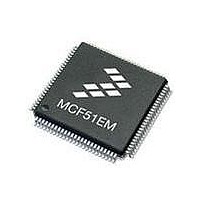MCF51EM256CLL Freescale Semiconductor, MCF51EM256CLL Datasheet - Page 206

MCF51EM256CLL
Manufacturer Part Number
MCF51EM256CLL
Description
IC MCU 32BIT 256KB FLASH 100LQFP
Manufacturer
Freescale Semiconductor
Series
MCF51EMr
Datasheets
1.MCF51EM128CLL.pdf
(2 pages)
2.MCF51EM128CLL.pdf
(54 pages)
3.MCF51EM128CLL.pdf
(636 pages)
Specifications of MCF51EM256CLL
Core Processor
Coldfire V1
Core Size
32-Bit
Speed
50MHz
Connectivity
I²C, SCI, SPI
Peripherals
LCD, LVD, PWM, WDT
Number Of I /o
63
Program Memory Size
256KB (256K x 8)
Program Memory Type
FLASH
Ram Size
16K x 8
Voltage - Supply (vcc/vdd)
1.8 V ~ 3.6 V
Data Converters
A/D 16x12b
Oscillator Type
External
Operating Temperature
-40°C ~ 85°C
Package / Case
100-LQFP
Processor Series
MCF51EM
Core
ColdFire V1
Data Bus Width
32 bit
Data Ram Size
16 KB
Interface Type
RS-232, LIN
Maximum Clock Frequency
50 MHz
Number Of Timers
3
Operating Supply Voltage
1.8 V to 3.6 V
Maximum Operating Temperature
+ 85 C
Mounting Style
SMD/SMT
3rd Party Development Tools
JLINK-CF-BDM26, EWCF
Development Tools By Supplier
DEMOEM
Minimum Operating Temperature
- 40 C
Lead Free Status / RoHS Status
Lead free / RoHS Compliant
Eeprom Size
-
Lead Free Status / Rohs Status
Lead free / RoHS Compliant
Available stocks
Company
Part Number
Manufacturer
Quantity
Price
Company:
Part Number:
MCF51EM256CLL
Manufacturer:
FREESCALE
Quantity:
110
Company:
Part Number:
MCF51EM256CLL
Manufacturer:
Freescale Semiconductor
Quantity:
10 000
- Current page: 206 of 636
- Download datasheet (11Mb)
ColdFire Core
8.3.3
8.3.3.1
The default operation of the V1 ColdFire processor is the generation of an illegal address reset event if an
access error (also known as a bus error) is detected. If CPUCR[ARD] is set, the reset is disabled and a
processor exception is generated as detailed below.
The exact processor response to an access error depends on the memory reference being performed. For
an instruction fetch, the processor postpones the error reporting until the faulted reference is needed by an
instruction for execution. Therefore, faults during instruction prefetches followed by a change of
instruction flow do not generate an exception. When the processor attempts to execute an instruction with
a faulted opword and/or extension words, the access error is signaled and the instruction is aborted. For
this type of exception, the programming model has not been altered by the instruction generating the access
error.
If the access error occurs on an operand read, the processor immediately aborts the current instruction’s
execution and initiates exception processing. In this situation, any address register updates attributable to
the auto-addressing modes, (for example, (An)+,-(An)), have already been performed, so the programming
model contains the updated An value. In addition, if an access error occurs during a MOVEM instruction
loading from memory, any registers already updated before the fault occurs contain the operands from
memory.
The V1 ColdFire processor uses an imprecise reporting mechanism for access errors on operand writes.
Because the actual write cycle may be decoupled from the processor’s issuing of the operation, the
signaling of an access error appears to be decoupled from the instruction that generated the write.
Accordingly, the PC contained in the exception stack frame merely represents the location in the program
when the access error was signaled. All programming model updates associated with the write instruction
are completed. The NOP instruction can collect access errors for writes. This instruction delays its
execution until all previous operations, including all pending write operations, are complete. If any
previous write terminates with an access error, it is guaranteed to be reported on the NOP instruction.
8.3.3.2
The default operation of the V1 ColdFire processor is the generation of an illegal address reset event if an
address error is detected. If CPUCR[ARD] equals 1, then the reset is disabled and a processor exception
is generated as detailed below.
Any attempted execution transferring control to an odd instruction address (if bit 0 of the target address is
set) results in an address error exception.
Any attempted use of a word-sized index register (Xn.w) or a scale factor of eight on an indexed effective
addressing mode generates an address error, as does an attempted execution of a full-format indexed
addressing mode, which is defined by bit 8 of extension word 1 being set.
If an address error occurs on an RTS instruction, the Version 1 ColdFire processor overwrites the faulting
return PC with the address error stack frame.
8-14
Processor Exceptions
Access Error Exception
Address Error Exception
MCF51EM256 Series ColdFire Integrated Microcontroller Reference Manual, Rev. 8
Freescale Semiconductor
Related parts for MCF51EM256CLL
Image
Part Number
Description
Manufacturer
Datasheet
Request
R

Part Number:
Description:
BOARD DEMO HARDWARE ONLY
Manufacturer:
Freescale Semiconductor
Datasheet:

Part Number:
Description:
IC MCU 32BIT 128KB FLASH 100LQFP
Manufacturer:
Freescale Semiconductor
Datasheet:

Part Number:
Description:
IC MCU 32BIT 128KB FLASH 80LQFP
Manufacturer:
Freescale Semiconductor
Datasheet:

Part Number:
Description:
IC MCU 32BIT 256KB FLASH 80LQFP
Manufacturer:
Freescale Semiconductor
Datasheet:
Part Number:
Description:
Manufacturer:
Freescale Semiconductor, Inc
Datasheet:
Part Number:
Description:
Manufacturer:
Freescale Semiconductor, Inc
Datasheet:
Part Number:
Description:
Manufacturer:
Freescale Semiconductor, Inc
Datasheet:
Part Number:
Description:
Manufacturer:
Freescale Semiconductor, Inc
Datasheet:
Part Number:
Description:
Manufacturer:
Freescale Semiconductor, Inc
Datasheet:
Part Number:
Description:
Manufacturer:
Freescale Semiconductor, Inc
Datasheet:
Part Number:
Description:
Manufacturer:
Freescale Semiconductor, Inc
Datasheet:
Part Number:
Description:
Manufacturer:
Freescale Semiconductor, Inc
Datasheet:
Part Number:
Description:
Manufacturer:
Freescale Semiconductor, Inc
Datasheet:
Part Number:
Description:
Manufacturer:
Freescale Semiconductor, Inc
Datasheet:











